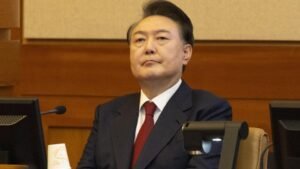The Constitutional Court of South Korea will hear closing statements on Tuesday in the impeachment trial of President Yoon Suk Yeol. The hearing marks the final stage of the proceedings, as the court prepares to decide whether to remove Yoon from office or reinstate him.
Yoon, who was impeached by parliament, faces allegations of overstepping his constitutional powers by declaring martial law on December 3 without justifiable grounds. If the court upholds the impeachment, he will be removed from office less than three years into his five-year term.
During the trial, Yoon defended his actions, arguing that he had the legal right to declare martial law. He insisted that his intention was not to impose full military rule but to warn against the opposition Democratic Party’s alleged abuse of its parliamentary majority.
The president and Jung Chung-rae, chairman of parliament’s judiciary committee, are expected to deliver their final arguments at the hearing scheduled to begin at 2 p.m. local time (0500 GMT). The panel of eight judges will deliberate after the closing statements and are expected to take several days to issue a ruling.
Throughout the proceedings, Yoon has maintained that his declaration of martial law, which lasted only six hours before he rescinded it, was not a failure. He claimed the decree ended sooner than planned but was necessary to prevent political instability.
He also dismissed accusations that he ordered military commanders to break into parliament to stop lawmakers from lifting the decree. According to Yoon, no harm was done, and the accusations were unfounded since no physical action was taken.
However, the parliament has argued that Yoon’s actions demonstrate a dangerous misuse of power. Lawmakers claim he is incapable of accurately assessing national emergencies and warned that he might attempt to impose martial law again if reinstated.
The outcome of the impeachment trial will have significant implications for South Korea’s political landscape. If the court rules against Yoon, he will be the second president in the nation’s history to be removed through impeachment. If reinstated, the decision could deepen political divisions between the ruling and opposition parties.
As the nation awaits the court’s verdict, the trial underscores growing concerns about the limits of presidential authority and the balance of power within South Korea’s democratic institutions.


